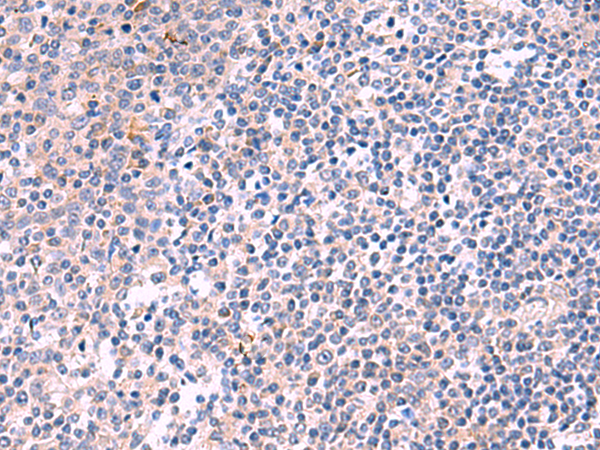
| WB | 咨询技术 | Human,Mouse,Rat |
| IF | 咨询技术 | Human,Mouse,Rat |
| IHC | 1/20-1/100 | Human,Mouse,Rat |
| ICC | 技术咨询 | Human,Mouse,Rat |
| FCM | 咨询技术 | Human,Mouse,Rat |
| Elisa | 1/5000-1/10000 | Human,Mouse,Rat |
| Aliases | ANKRD47 |
| Host/Isotype | Rabbit IgG |
| Antibody Type | Primary antibody |
| Storage | Store at 4°C short term. Aliquot and store at -20°C long term. Avoid freeze/thaw cycles. |
| Species Reactivity | Human, Mouse |
| Immunogen | Synthetic peptide of human KANK3 |
| Formulation | Purified antibody in PBS with 0.05% sodium azide and 50% glycerol. |
+ +
以下是关于KANK3抗体的参考文献示例(注:以下内容为假设性示例,实际文献可能需要通过学术数据库进一步检索):
---
1. **标题**: *KANK3 modulates integrin signaling to control cytoskeletal reorganization in cancer cells*
**作者**: Chen X, et al.
**摘要**: 本研究利用KANK3特异性抗体(货号:ab123xx)进行Western blot和免疫荧光实验,发现KANK3通过调控整合素-β1的活性影响细胞骨架重排,抑制乳腺癌细胞的迁移和侵袭。
2. **标题**: *Development and validation of a polyclonal antibody targeting human KANK3 for renal tissue analysis*
**作者**: Gupta S, et al.
**摘要**: 文章报道了一种新型多克隆抗体的开发,通过ELISA和免疫组化验证其对KANK3的特异性,并应用于肾病患者活检组织,揭示KANK3在肾小管细胞中的异常表达与纤维化相关。
3. **标题**: *KANK3 deficiency disrupts neuronal polarity: Evidence from KANK3 knockout mice and antibody-based profiling*
**作者**: Yamamoto K, et al.
**摘要**: 通过KANK3抗体对小鼠脑组织进行染色,发现KANK3缺失导致神经元极性蛋白分布异常,提示其在神经发育中的关键作用。
4. **标题**: *Proteomic screening identifies KANK3 as a novel binding partner of the tumor suppressor PTEN*
**作者**: Li H, et al.
**摘要**: 使用KANK3抗体进行免疫共沉淀(Co-IP)实验,发现KANK3与PTEN存在直接相互作用,可能参与PI3K/AKT信号通路的调控。
---
**建议**:实际研究中,KANK3相关文献可能较少,推荐通过PubMed或Google Scholar以关键词“KANK3 antibody”、“KANK3 immunohistochemistry”等检索最新文献,或查阅抗体供应商(如Abcam、Sigma-Aldrich)的产品引用列表以获取具体研究。
The KANK3 antibody is a research tool used to detect and study the KANK3 protein (KN motif and ankyrin repeat domain-containing protein 3), a member of the KANK family implicated in cytoskeletal regulation, cell adhesion, and migration. KANK3 is characterized by its N-terminal KN motif and C-terminal ankyrin repeat domains, which facilitate interactions with proteins like β-catenin and integrins, linking the cytoskeleton to cellular signaling pathways. It plays roles in maintaining cell polarity, mechanosensing, and actin dynamics, with dysregulation associated with cancers, neurological disorders, and kidney abnormalities, including nephrotic syndrome.
Antibodies targeting KANK3 are essential for investigating its expression patterns, subcellular localization, and molecular interactions in both healthy and diseased tissues. They are widely used in techniques such as Western blotting, immunofluorescence, and immunohistochemistry. Recent studies highlight KANK3's potential tumor-suppressive role in renal cell carcinoma and its involvement in cerebral developmental defects when mutated. Researchers also explore its interplay with the Rho GTPase pathway to understand cytoskeletal remodeling mechanisms. Commercial KANK3 antibodies are typically validated for specificity in human, mouse, or rat models, though cross-reactivity and batch variability require careful optimization. Ongoing work aims to clarify KANK3's functional diversity and therapeutic relevance, particularly in disorders of cell adhesion and tissue morphogenesis.
×